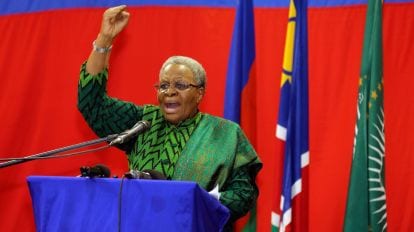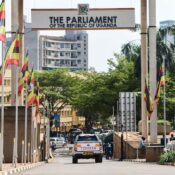
The president-elect of Namibia promises “radical shifts” in addressing unemployment and poverty
In her first press conference since winning the election last week, Namibia’s president-elect, Netumbo Nandi-Ndaitwah, promised “radical shifts” to address the high rates of unemployment and poverty in the nation on Thursday.
Nandi-Ndaitwah, who will become the first female leader of the southern African nation when she assumes office in March, hinted that she may split from her predecessors in the SWAPO party on certain social and economic concerns. Since Namibia gained independence from South Africa’s apartheid regime in 1990, SWAPO has been in charge of the country.
Nandi-Ndaitwah, 72, stated, “It’s not going to be business as usual,” in reference to her presidency. “We must have radical shifts in addressing the plight of our people.”
Although she did not provide concrete proposals, she did note the need for more equal economic distribution and land reform.
The World Bank considers Namibia to be an upper-middle-income nation, although it is among the most unequal in the world, with high rates of poverty that are partially caused by decades of white minority control.
According to a government assessment from 2021, 43% of people were living in “multidimensional poverty,” a category that considers a number of characteristics, including income, access to public services, and education.
According to data given by the electoral commission, Nandi-Ndaitwah received over 57% of the vote in the election held on November 27. Opposition parties, however, have protested and declared that they will take the outcome to court.
Technical issues, such as ballot paper shortages, plagued the election. The Independent Patriots for Change, the largest opposition group, claimed that deliberate voter suppression had taken place.
Nandi-Ndaitwah dismissed these accusations.
“I am not even listening to those critics,” she replied.
The electoral commission asked all Namibians to accept the results, stating that the election was free and fair.
Exploration of Oil
With large discoveries made by corporations like TotalEnergies (TTEF.PA) and Shell (SHEL.L), Namibia, a country of 3 million people, has become a hotspot for oil exploration. However, development may be slowed by an unusually high amount of gas in the fields.
Nandi-Ndaitwah simply stated that foreign direct investment was welcome as long as it was “in accordance with our terms”; she made no mention of her oil and gas strategy.
According to Graham Hopwood, executive director of the Institute for Public Policy Research in Windhoek, energy investors wishing for stability should be reassured that SWAPO would continue to hold its position.
“The SWAPO manifesto spoke of greater local content and participation in the oil and gas sector but did not commit to specific timelines or targets,” he stated.
“Investors will likely feel they can deal with these prospects as long as they are consulted.”
Namibia is now governed by temporary President Nangolo Mbumba, who is also a member of the SWAPO party, until Nandi-Ndaitwah assumes office.
All Categories
Recent Posts
Tags
+13162306000
zoneyetu@yahoo.com



